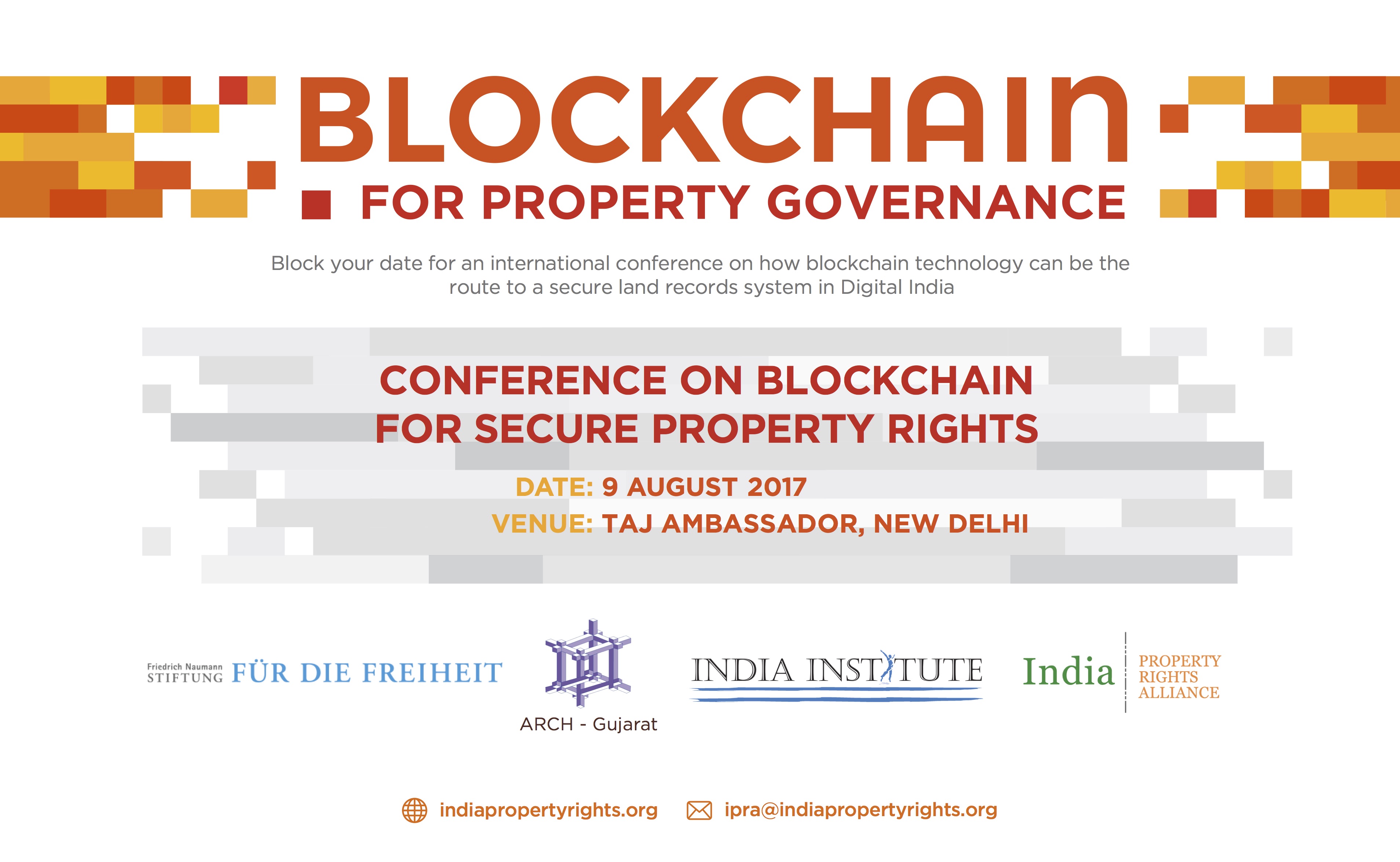Registration Closed
For any other details, write to us at info@indiapropertyrights.org
HighlightsBuilding Trust, Transparency and Security through Technology: Technology for a World without Hunger: Dr. Ronald Meinardus, Regional Director, FNSt Blockchain Technology- Applications for Property Governance: Mr Vishal Batra, Blockchain Solutions Architect, IBM Research, New Delhi Session 1: Securing Property Rights through Blockchain – Global Case Studies Session 2: Opportunities & Challenges for distributed land registries in India Moderator: Mr Ananth Padmanabhan, Fellow, Carnegie India Session 3: Public Policy for Blockchain and Data Protection Moderator: Mr Sumandro Chattapadhyay, Research Director, Centre for Internet and Society Vote of Thanks: Mr Manoj Mathew, Focal Point, India Property Rights Alliance |
Click here to view speaker profiles
Across the world, land registries are almost entirely badly kept, mismanaged or distorted. This lack of secure property rights is an endemic source of insecurity and injustice for the general public. However, technology has the potential to provide a solution to this problem. With the fast-paced world of fintech, technology is transforming the conventional financial industry. Sweden and Georgia are pioneering the application of blockchain for secure land record maintenance. The technology offers great potential to India’s property right governance, especially with the country’s current focus on digital India.
Against this background, the main aim of the Block Chain Technology Conference (BCTC) was to foster dialogue between experts, international practitioners and policy makers to craft a model policy framework to aid in the adoption of the technology for property governance in India.
BCT and secure land rights
A blockchain with regard to property rights is a digital ledger, a record of accounts, of who owns what, and when. When applied to records of property titles, blockchain will eliminate the scope for forgery, tampering and destruction of records. It allows for smart contracts, and makes land title transfers much more convenient and efficient.
International experience
Some countries have started adopting the use of BCT while some others are cautiously exploring the option through pilots. Georgia, Honduras and Sweden are using the blockchain technology to conduct pilots for creating an immutable title records system. In Georgia, use of this technology is expected to allow more secure mortgages, contracts, and mineral rights. To model a property purchase records system using block chain and smart contract technology, ChromaWay is piloting the first block chain project in Sweden. The goal of the pilot is to evaluate the technology from a legal, business and IT perspective.
Scope for blockchain for land records in India
With Digital India, our country is currently undergoing the biggest fintech revolutions in the world. But, despite a push for reform through the Digital India Records Modernization (DILRMP), India’s current land title system remains plagued with deficiencies. Challenges such as incomplete registration of land records, enormous time gap in updating title changes and forgery, and illegal mutation of title records are still palpable in the domain of property. Instituting a system of unerasable data records with a permanent audit trail will perhaps be a comprehensive solution to most of these problems related to secure property rights. It will make all transactions verifiable and accountable. Besides securing the rights of lawful owners of property, it will increase the level of trust in the system, improve ease of doing business, and reduce property related litigation. Banks and insurance companies will have to spend on the verification of records, leading to higher availability of credit , and reduced operational expenditure. Hence, adopting new technology will not only pave way for accountability and transparency in the system, but also secure the property rights of the citizens of this country.
The Conference
The conference featured four focussed sessions:
- Building Trust, Transparency and Security through Technology
- Securing Property Rights through Blockchain– Global Case Studies
- Opportunities and Challenges for distributed land registries in India
- Public Policy for Blockchain and Data Protection
Conference Partners
- The Friedrich Naumann Foundation for Freedom (FNSt), New Delhi
- The Action Research in Community Health and Development (ARCH), Gujarat
- India Institute (II), New Delhi
- India Property Rights Alliance

